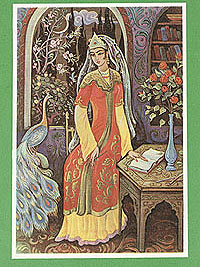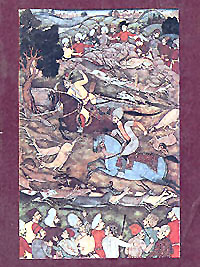 |
|
Uzbekistan - Literature |
|||
|
In the 18-19 centuries the Ferghana Valley, Khorezm and Bukhara became the largest literary' centers of the region. Poems by Nishaty Khorazmy came on the scene, influenced enormously by works of Navoi and Fuzily. Nodira and Uvaisy wrote about traditional theme of love. In early 19th century satirical pamphlets by Gulkhany, Makhmur and Agakhy were popular. Works by Munis, his historical "Heavenly garden of joy", finished later on by Agakhy, the author of the vast "Talisman of those in love", became a masterpiece of the Uzbek classic literature. There were progressive poets of the period such as Mukumy, Furkat, Avaz Otar, Zavky, Khamza Khakimzoda Niyozy, Sadriddin Ainy, and Anbar Otin. In 1915 Khamza set up a theatrical group and wrote plays on local themes. In early 20th century new poets and writers emerged in Uzbek literature, such as A. Kocliry, A. Chulpon, A. Fitrat, Oybek, G. Gulom, A, Kakhkhor, Kh. Olimjon, Uyghun, and K. Yashin. New genres like political satire, feuilleton, and pamphlet came on the scene. In 1923 satirical magazine "Mushtum" began to be published. In 20 and 30s of the last century, the poetry prevailed in Uzbek literature. In 5O-6Os various stories and novels by authors such as I. Rakhim, Oybek, Shukhrat, S. Akhmad came on the scene. Oybek, Abdulla Kakhkhor, and Ibrakhim Rakhim wrote about the countryside life. Also, the historical theme saw its rise. However, spiritual shape of the contemporary person remained as the main topic in literature. Among such works there are novels by P. Kodirov, A. Yokubov, and Murmukhsin. In early 60s, stories and memoirs were further developed. One could observe a delicate mastery in the diversity of genres in the poetry by Shukrullo, E.Vokhidov, T. Tula, A. Oripov, Zulfiya, and others. Historic and biographic themes in the works by Uighun, Izzat Sulton, and others occupy a significant place in the playwriting, as well. The Uzbek literature during the period of independence is a not just another historical stage in the development of the national literature, but it is a display of the new art - aesthetic phenomenon, with its new creative features. It became independent of ruling communist regime and ceased to be a state literature. Respectively, the state stopped rewarding for "services" and punishing for "disobedience". Now the modern Uzbek literature cares of spiritual enrichment of each individual, and perfection of social structures and industrial attitudes are no longer main topics for it anymore. It wishes to understand the person deeper - in all of its variety of interpersonal relations. A person has become its main subject, but not a typical hero given some typical circumstances.
The modern Uzbek literature delivers itself of primitivism, becomes diverse, more courageous in the choice of a form and style. However with freedom of creativity and plurality of opinions, there is a danger of dull works to come on the scene. The Uzbek poetry, continuing a centuries-long tradition, remains as the leading genre of the national literature. The attitude and poetic realization of the world saw a new stage in the poems by Omon Matchon, Barat Boykobulov, Sirojiddin Sayyid, Normurod Narzullaev, Shavkat Rakhmon, Chulpon Ergash, Azim Suyun, Usmon Azim, Ikrom Otamurod, Abduvali Kutbiddin, Aziz Said, Bakhrom Ruzimuhammad, Muhammad Yusuf, Iqbol Mirzo, and others. Contemporary poetry pays a great deal of attention towards not only circumstances and enthusiasm, but also reflection of complex spiritual state and strive for realization of the sacred feelings of an individual, study of his rich and diverse soul. "Ancestors" ("Turkiylar"), "Acknowledgment" ("Iqror") by Sh. Rakhmon, "Confession" ("Istighfor"), "The white and black" ("Oq va qora") by Azim Suyun,"Non-axplanatory dictionary" ("Izohsiz lughat") by Abduvali Kutbidin, "Dream" ("Tush"), "Way" ("Yo'l") by A. Said are typical examples of the modern poetry. For this period variety of the forms and styles, and wish to combine leading traditions of poetry of the East and West are common. |

